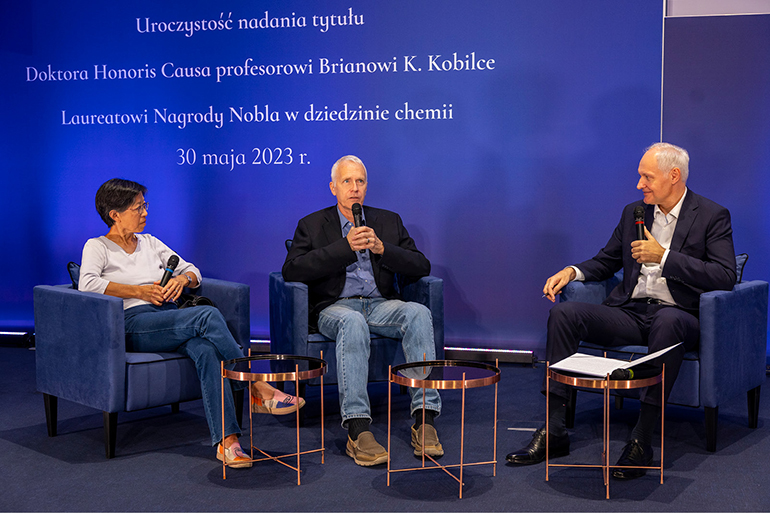Start - Aktualności - Prof. Brian Kobilka met with the academic community

Prof. Brian Kobilka met with the academic community
Prof. Brian Kobilka met with the academic community of the Silesian University of Technology. Students, doctoral students and employees of the University gathered at the Education and Congress Centre on May 30th and had the opportunity to ask questions to the Nobel Prize winner. The initiator of the meeting was prof. dr hab. Eng. Marek Pawełczyk, Vice-Rector for Science and Development.
It was an extraordinary meeting with Doctor Honoris Causa prof. Brian Kobilka Students, doctoral students and employees of the University had a chance to talk to an outstanding scientist - winner of the Nobel Prize in chemistry. The American scientist, who yesterday received the title of DHC at the Silesian University of Technology, willingly answered questions from the audience. Also, about his private life. He shared his memories of his visit to Sweden when he received the Nobel Prize, and also talked about the beginnings of his work at the famous Stanford University.
“I was lucky because when I moved to Stanford, I got a brand-new lab, after another Nobel laureate who died. There I set up my research centre. I got a laboratory on the first floor with 10 workstations. It is good that the laboratory was granted to me in writing, because a few years later they tried to take it away from me, fortunately it did not happen - recalled Prof. Kobilka. - There were 10 people working in my team for a significant part of the time, there was a moment when I hired too many people to work - I had 19 employees, but we did not manage to work effectively. I have drawn conclusions from this and now I am trying to work in a small team, and I am involved in its work myself - added the Nobel Prize winner.
The outstanding scientist admitted that he willingly engages PhD students, who often perform very responsible tasks in his team.
“For me, learning is about trying and making mistakes. It is important to draw conclusions from this. If an experiment fails and you don't understand why, it's a waste of time and money. That's why when I prepare expensive or time-consuming experiments, I try to plan them in such a way that after all the experiments can be carried out, so-called, autopsy - to understand what the cause of the failure was” - explained the scientist.
The doctoral students and scientists present in the room listened attentively to the valuable tips of prof. Kobilka, who praised the lectures of our scientists during the scientific seminar.
In addition to questions about professional life, prof. Kobilka also shared his memories of a family that has its roots in the Czech Republic and did not hide his admiration for the history and culture of the region.
- What will I remember most from this stay? Certainly, a visit to the Silesian Museum and paintings painted by miners. I know they do hard work. In addition, the political history of this region, the transition from one country to another, had an impact on the culture of the region and this is something I will remember for a long time - added Prof. Kobilka.
The entire report from the meeting will soon appear on the social media of the Silesian University of Technology.
The partner of the event is the Upper Silesian and Zagłębie Metropolis.









